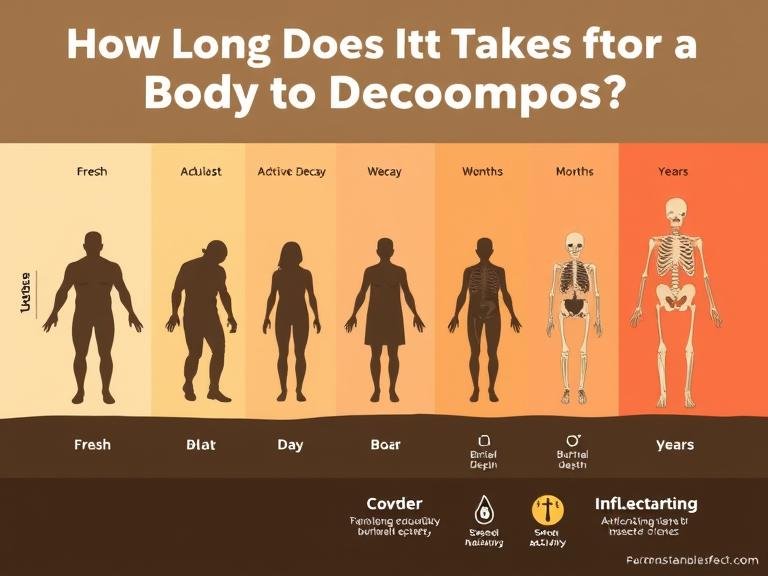How Long Does It Take for a Body to Decompose? Death is a natural part of life, and decomposition is the process through which the body breaks down after death. While it’s a topic many people find uncomfortable, understanding how long it takes for a body to decompose is important in fields like forensic science, archaeology, and even environmental studies.
The decomposition process depends on many factors, including temperature, moisture, burial method, and exposure to the elements. In some situations, it may take only weeks for a body to break down significantly; in others, the process can take decades or even centuries.
Table of Contents
The Basic Stages of Human Decomposition
Decomposition happens in several stages, each with its own visible and chemical changes.
1. Fresh Stage (0–3 Days)
- Timeframe: Begins immediately after death.
- Changes:
- The heart stops pumping, so oxygen stops circulating.
- Cells begin to die and release enzymes that start breaking down tissues.
- Rigor mortis (stiffening of muscles) occurs within hours.
- Skin may appear pale and waxy.
- Bacteria Activity: Naturally occurring bacteria in the gut begin to multiply and spread.
2. Bloat Stage (3–7 Days)
- Timeframe: Usually within the first week after death.
- Changes:
- Gases produced by bacteria cause the body to bloat.
- Skin color may change to greenish or purplish tones.
- Fluids may begin to leak from body openings.
- Odor: Strong odors develop due to gas buildup and the release of volatile compounds.
3. Active Decay (1–3 Weeks)
- Timeframe: Typically from the end of the first week to around 3 weeks postmortem.
- Changes:
- Soft tissues break down rapidly.
- The skin may rupture, releasing gases and fluids.
- Insects such as flies lay eggs, leading to maggot activity.
- Odor: Peak odor intensity during this stage.
4. Advanced Decay (1–2 Months)
- Timeframe: Several weeks to two months after death.
- Changes:
- Most soft tissue has decomposed.
- Only skin, cartilage, and bones remain, along with some dried tissue.
- Insect Activity: Decreases as there is less flesh for larvae to feed on.
5. Skeletonization (Months to Years)
- Timeframe: Can take several months to decades depending on conditions.
- Changes:
- All that remains is the skeleton, which will continue to weather and break down over time.
- Long-Term: In dry environments, bones can last hundreds or even thousands of years.
Factors That Affect How Long It Takes for a Body to Decompose
The rate of decomposition can vary widely based on environmental and situational factors.
1. Temperature
- Hot Climates: Warmth accelerates bacterial activity and insect infestation, speeding up decomposition.
- Cold Climates: Cold slows bacterial and insect activity, sometimes preserving the body for months or years.
2. Moisture
- High Humidity: Encourages bacterial growth and insect activity.
- Dry Conditions: Can lead to mummification, where skin and tissues dry out rather than decompose normally.
3. Burial Depth
- Shallow Graves: Allow more oxygen and insect access, speeding decomposition.
- Deep Graves: Limit oxygen and insect activity, slowing the process.
4. Cause of Death
Certain causes of death (such as infectious diseases or trauma) can affect the initial bacterial load and tissue breakdown.
5. Clothing and Wrapping
Heavy clothing, plastic coverings, or coffins can slow decomposition by reducing insect access and oxygen flow.
6. Soil Composition
Acidic soils can break down bones faster, while certain minerals may preserve them longer.
Average Timelines in Different Conditions
| Condition | Approximate Time to Skeletonization |
|---|---|
| Exposed in hot, humid climate | 1 month |
| Exposed in temperate climate | 6 months to 1 year |
| Buried in coffin underground | 10–15 years |
| Buried without coffin, shallow grave | 1–2 years |
| Frozen conditions | Decades or longer |
| Desert/mummification | Can last centuries |
Decomposition in Special Circumstances
Underwater
Bodies decompose more slowly underwater due to lower temperatures and reduced oxygen, but aquatic life can alter the process. In cold water, skeletonization may take several years.
Frozen or Icy Conditions
Cold temperatures can almost completely halt decomposition, leading to natural preservation. Famous examples include bodies preserved in glaciers for thousands of years.
Embalming
Embalming fluid delays decomposition by killing bacteria and slowing tissue breakdown. An embalmed body in a sealed casket may take decades to fully decompose.
Why Understanding Decomposition Matters
Knowing decomposition timelines has practical applications:
- Forensic Science: Helps determine time of death in criminal investigations.
- Archaeology: Provides insight into ancient burial practices and preservation.
- Environmental Studies: Informs about nutrient cycles and ecosystem changes.
Key Takeaways
- The full decomposition process can take weeks to centuries depending on conditions.
- Factors such as temperature, burial method, moisture, and exposure to insects have a major influence.
- The process occurs in five main stages: fresh, bloat, active decay, advanced decay, and skeletonization.
- In warm, exposed environments, complete skeletonization can happen within months, while in cold or sealed environments, it can take decades.
Frequently Asked Questions (FAQs)
1. How long does it take for a body to decompose in a coffin?
In a traditional coffin underground, it may take 10–15 years for a body to fully skeletonize, though soft tissues break down much earlier.
2. Does a body decompose faster above ground or below?
Above ground generally decomposes faster due to more exposure to oxygen, insects, and weather.
3. Can bodies mummify naturally?
Yes, in very dry or cold conditions, bodies can naturally mummify, slowing decomposition for decades or centuries.
4. How long does it take for bones to decompose?
In normal soil, bones may last 50 years or more; in ideal preservation conditions, they can last thousands of years.
5. What role do insects play in decomposition?
Insects, particularly flies and beetles, accelerate the breakdown of soft tissues during active decay.
6. Can embalming stop decomposition entirely?
No, embalming delays decomposition but does not prevent it forever.

